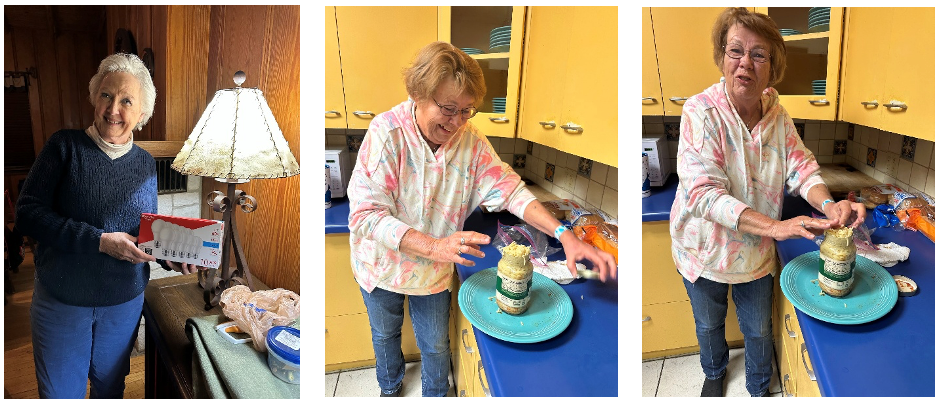Transforming Donations to Disaster Recovery & Resiliency
- Libby Janes

- Mar 6, 2024
- 4 min read
Updated: Mar 15, 2024
Editor's Note: The blog article is accompanied by a two episode Disaster Partnership Conversation podcast on Sunspots, the podcast of the Synod of the Sun. These episodes feature Kathy Lee-Cornell speaking with Jim Kirk, the Associate for Disaster Response in the United States at Presbyterian Disaster Assistance and Michelle Muñiz, Disaster Recovery Coordinator for Puerto Rico.
You can listen to Sunspots wherever you get your podcast content or go to https://www.synodsun.org/sunspots.
As we are currently witnessing Texas battling the largest wildfire in their state’s history, do you ever wonder how the gifts of your dollars and cents placed in offering plates or donated through an online submission form actually makes a difference in the lives of people and communities impacted by disasters?

In less than a week after fires began to blaze across parts of Texas and Oklahoma, destroying homes, livestock, and livelihoods, each of the impacted counties have reported being overwhelmed by the influx of donated goods – pallets of water bottles, trailers full of clothing and household items – intended to support survivors and first responders.
I hope this month’s SPDR blog and corresponding Disaster Partnership Conversation Podcast episodes highlight the connectional and healing power of being Presbyterian and provide more insight into how your gifts through denominational offerings, such as the One Great Hour of Sharing (OGHS), and special appeals like the collection for Palo Duro Presbytery’s response to the ongoing wildfires, actually bolsters our local congregations and the relationships shared between members and neighbors, churches and ministry partners, who are sifting through the aftermath of devastating events.

A car sits in front of the burned Rose Trailer Sales business on Texas Highway 136 on Thursday. Residents have been working to recover from the wildfires devastating parts of the Texas Panhandle. Photo by Mark Rogers for the Texas Tribune
Featured in this two-part podcast are the Rev. Dr. Jim Kirk, who for the past eight years has served as the Associate for Disaster Response in the U.S. for Presbyterian Disaster Assistance (PDA) and Michelle Muñiz, who serves as the Disaster Recovery Coordinator for the Presbytery of San Juan in Puerto Rico.

Puerto Rican Presbyterian leaders represented each local Presbytery during the Puerto Rico VOAD Conference. In the picture: Michelle Muñiz, Rev. Rubén Ortíz (Presbiterio del Suroeste (Southwest), Rev. James Kirk, Rev. Arelis Cardona (Presbiterio de San Juan), and Rev. José Robles (Presbiterio del Noroeste(Northwest).

In part-one of this conversation, Jim emphasizes how PDA is a program of the Presbyterian Church (USA) denomination that is entirely supported by designated giving. Meaning, PDA’s only source of funding is from individuals, churches, presbyteries and synods giving directly through the One Great Hour of Sharing offering and special appeals that are publicized by the PC(USA) when a large disaster strikes. Emergency grants, such as the one headed to Palo Duro Presbytery, are made possible because of donations to the OGHS offering last year.
In addition to responding to immediate needs, PDA’s commitment to the long-term duration of the disaster recovery “clock,” has guided them in stewarding the generosity of Presbyterians through intentional partnerships that allow for these donations to directly support disaster response, recovery, and mitigation years beyond the initial event.

As Michelle explains, “Through this funding, churches [in Puerto Rico] were able to develop new ways to respond or to actually expand the services that they were already doing, but we also were able to partner with organizations that were not necessarily connected to our church and even with organizations that were working in communities where there are no Presbyterian presence.”
Michelle gives examples of how congregations are not simply preparing for if a disaster happens but when disasters happen, so they are now equipped with solar-powered energy and water tanks to support their communities when electricity and clean water access are limited. Another project supported by Puerto Rico churches and community partners involved developing street names and signs so local responders can more efficiently reach individuals in need.

Using funds donated to Hurricane Maria (2017) disaster response, PDA provided a grant in 2019 to ViequesLove’s Community Street Naming Project, whose goal is to name 300 unnamed streets in Vieques. This project not only provided street names, but assigned every household and building with address numbers, uploaded this information to online mapping platforms, and coordinated with 911 to integrate the new data into their system.
I encourage you to listen to this episode fully, and I pray you will hear for yourself an invitation to be a part of the connectional and healing ministries of the Presbyterian Church. You can join the 2,000 PDA volunteers who have already served and supported Puerto Rico Disaster Recovery since the arrival of Hurricane Maria and subsequent disasters. And by doing so you can see for yourself the tangible impact of Presbyterian generosity at work in our world in what Michelle beautifully describes as “mutually beneficial and transformational relationships.”
Lastly, check back in when part two of this conversation is shared. Jim, Michelle and I will talk about resiliency, grief, post-traumatic growth, and more. Reach out to Michelle to learn more about supporting disaster recovery and volunteering in Puerto Rico by emailing: puertorico.pda@gmail.com.
Please continue to pray for our congregations and communities impacted by the Texas and Oklahoma fires. Follow the Synod of the Sun’s social media for updated reports from Scott Campbell, Executive Presbyter, Palo Duro Presbytery. Donations may be made directly to Palo Duro Presbytery or through the Synod of the Sun.





Comments